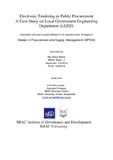| dc.description.abstract | The research on ―Electronic Tendering in Public Procurement: A Case Study on Local Government Engineering Department (LGED)‖ was done to evaluate the performance of LGED in E-GP implementation and simultaneously identification and overcome the barriers to ease of E-GP system implementation, because the government has taken initiative to curb the corruption, mismanagement of public fund and social anarchy revolving from government procurement, through introducing E-GP system. It was decided that E-GP would be implemented primarily in four Public organizations like Local Government Engineering Department (LGED), Roads and High ways Department, Rural Electrification Board and Bangladesh Water Development Board (BWDB). After the successful implementation, the system will be rolled over to the other Public organizations. Local Government Engineering Department (LGED) has been implementing the E-GP system in progressively with a great commitment and motivation. The research was carried out by reviewing of PPA-2006 and PPR-2008, E-GP guide lines and E-GP implementation track of India, Singapore, Korea and many others countries. Here both primary data from questionnaire survey and secondary data from central Procurement unit and Central Training unit were used. The sample were selected randomly and it was 64 nos. of Executive Engineer(Xen), Senior Assistant Engineer(Sr.AE), Assistant Engineer(AE), Upazila Engineer (UE) and Contractors from different districts of Bangladesh. The data obtained were analyzed by MS Excel Spread Sheet and produced different tabular and graphical forms to present it to the readers for better perception of the situations. It was found that LGED started to pilot the system in four districts like Dhaka, Gopalgonj,Faridpur and Sunamgonj in 2011-12 fiscal year. Then in Fiscal Year 2012-13, 2013-14 the targets were 100 and 1400 nos. but achieved 112 nos. (112%) and 4834 nos. (345%). In FY 2014-15 the target was 2400 nos. but up to the November 2014 the progress was 1755 nos. of tenders which was 73% of target. The trend was very impressive and praiseworthy. About 97 % respondents believed that the E-GP would be implemented successfully. At the same time 99% respondents expected the E-GP system for the free, fair and transparent administration and participation in tender. The main challenges were lack of adequate internet facilities, training of LGED staff and bidders, insufficient branches of affiliated banks and lack of sincere support of banking officials, software problems in E-GP system. The e-GP system software only supports the browser Mozilla Firefox version 13 and Internet Explorer 8. But the browser version are upgrading regularly. The system does not link the existing estimating software RSEPS of LGED to make the Bill of Quantities (BOQ). The challenges found here matched to challenges mentioned in previous study ― Operational Risk in e-GP Implementation of Bangladesh Perspective‖ by Md. Mahboob Hassan, Executive Engineer, LGED for the Master Program on Public Procurement Management for Sustainable Development‖, under International Training Centre of ILO, Turin Italy and ―Challenges of Implementing electronic Government Procurement: A case study on Bangladesh Water Development Board‖ conducted by Syed Rafiqul Alam for the Masters in Procurement and Supply Management‖, under IGS ,BRAC University and many others report. Therefore the results of this research work are acceptable and validated for the future development of E-GP system implementation in LGED. This will help LGED to address the challenges for easy implementation of E-GP system. In my research work there might have some errors in data, collected by questionnaire survey regarding training needs, internet speed satisfaction, educational qualifications and power supply continuity. Some of the respondents might have hidden some information. | en_US |

